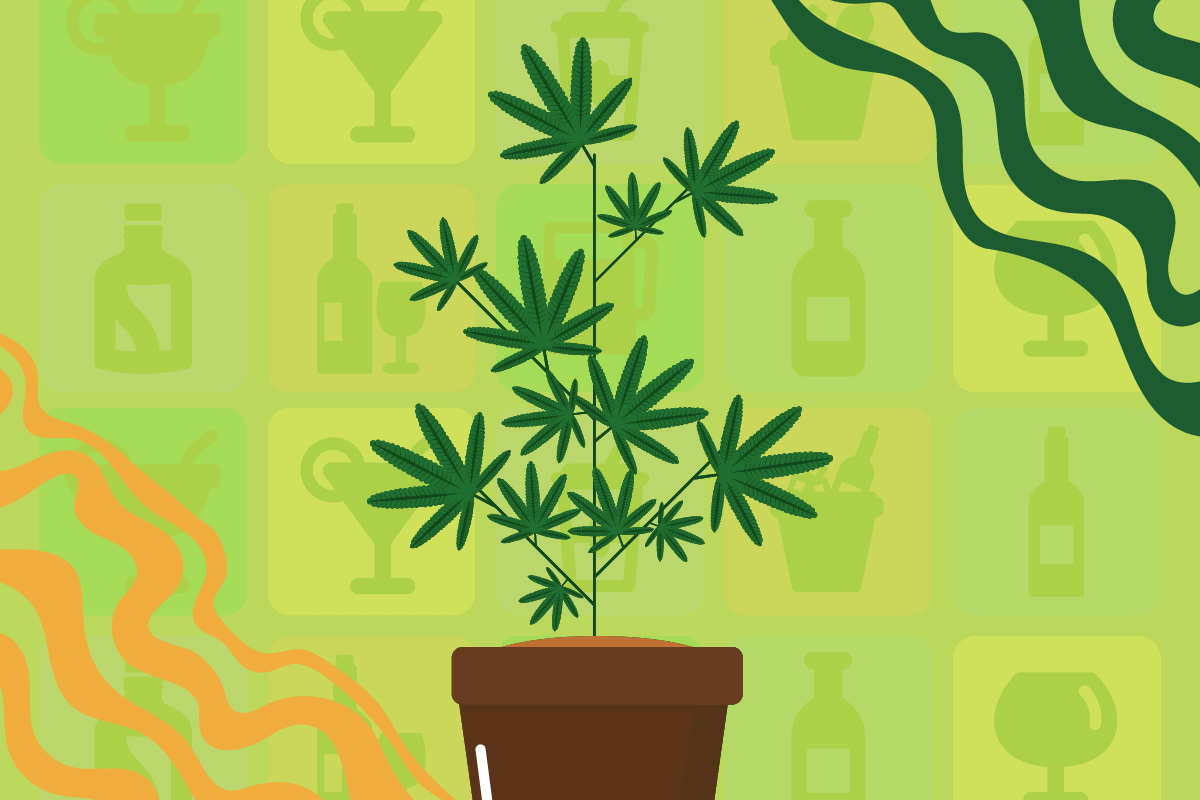Drinking alcohol has been inseparable among us humans for decades, generally speaking, weed as well. Both cannabis and alcohol use are highly associated with motor vehicle crashes which sparks up several researches to find the link between these two. About 25% of motor vehicle fatalities are often involved with drunk drivers and drivers who test positive for cannabis are also involved in many other accidents. What makes weed and alcohol similar is that both acutely impair driving-related skills in a dose-related way. Cannabis vs alcohol are often being compared to one another and this topic has been a hot debate for quite some time now as an attempt and hope to help break the stigma of cannabis.
But there’s more to what I just said. This article has rounded up every piece of information possible associated with weed and alcohol, the two beloved and (possibly) problematic substances.
Key Takeaways
- Cannabis is used to call every product made from cannabis plants which contain both psychoactive compounds like THC and therapeutic effects like CBD.
- Alcohol in drinks is called ethanol which causes you to be drunk and can be addictive.
- Cannabis provides numerous health benefits such as reduced inflammation, seizures, and anxiety.
- Altered time perception, impaired coordination, impaired brain development, and schizophrenia are some of the negative effects of cannabis.
- Alcohol has some interesting benefits such as a lower risk of dementia in older adults and a lower risk of heart disease when drinking in low to moderate amounts.
- Drinking alcohol can lead to restlessness, shorter attention span, and impaired judgment.
- Alcohol is more addictive than cannabis, but cannabis tends to have rising rates of dependence.
- It’s almost impossible to get cannabis overdose while the rate of mortality from alcohol overdose is more common.
- Alcohol is more likely to cause the use of violence, domestic abuse, and sexual assault far more than cannabis use.
Getting to Know Cannabis and Alcohol
Cannabis
Cannabis refers to all products derived from cannabis plants that contain approximately 540 different chemical compounds including the two most famous cannabinoids tetrahydrocannabinol (THC) and cannabidiol (CBD). THC is believed to be the main psychoactive compound in the plant that delivers high or euphoric effects to those who consume it. CBD, on the other hand, does not make you intoxicated but is full of therapeutic potential instead.
Alcohol
The alcohol in drinks such as liquor, beer, and wine is called ethanol or ethyl alcohol – the main ingredient in the drink that makes you drunk. Alcohol is produced when yeast ferments the sugars in different foods like grains, fruits, and vegetables. It’s considered a drug that affects the way your body works which can be toxic and cause the development of addiction. According to the 2019 data on global alcohol consumption by the World Health Organization (WHO), an estimated 400 million people aged 15 years and older have alcohol use disorders (AUD), and an estimated 209 million are alcohol dependent.
Although alcohol can make you feel relaxed and happy when drinking in a small amount, it has a depressant effect meaning that it affects the way you think, feel, and behave together with slowing down messages that travel between the brain and body.
What will happen when we mix weed and alcohol together?
Both weed and alcohol can impair a person’s judgment, and when combining these two the effect may intensify which can cause blackouts, memory loss, and increase risky behaviors. A 2011 study found that chronic cannabis users who also drink alcohol tend to have worse cognitive functioning than those who only drink alcohol. As stated above, either cannabis or alcohol alone already results in impaired motor skills, imagine mixing them together. People who co-use weed and alcohol showed impaired driving performance as stated in a 2013 review and tend to consume more of both drugs which may increase the risk of dependence on cannabis, alcohol, or both. These are enough evidence and reasons to warn and suggest you not to mix weed and alcohol together.
Which one is more beneficial?
Benefits of Cannabis
Cannabis is famous for its ability to help with several conditions and has been widely used both medically and recreationally. Here are some of the promising benefits that cannabis delivers:
- CBD, a chemical compound in weed, is proven in a 2012 study to have an anti-inflammation effect and help with neuropathic pain.
- Cannabis has positive effects in reducing symptoms and frequency of seizures.
- There is a piece of evidence supporting the use of cannabis for relieving depression and PTSD. Other than that, cannabis is also effective in treating anxiety disorder, social anxiety disorder, panic disorder, and obsessive-compulsive disorder (OCD).
- Patients who experience side effects of chemotherapy often use medical cannabis to alleviate the conditions.
Benefits of Alcohol
Many of you (including me) might be surprised that alcohol may have some ability to help with health benefits. BUT it still can be dangerous to everyone so please be cautious.
- Drinking alcohol moderately (1 to 6 drinks weekly) is associated with a lower risk of dementia among older adults.
- Normal-weight women consuming a light to moderate amount of alcohol tend to gain less weight and have a lower risk of becoming overweight.
- While drinking beer regularly can result in a beer belly, moderate to high wine consumption may have the opposite effect.
- Light to moderate alcohol consumption is linked to a reduced risk of several cardiovascular diseases.
Which one is more harmful?
Dangers and Health Risks of Cannabis Use
Even though consuming cannabis isn’t deadly, it still causes harmful effects on your mind and body. Not everyone finds weed effects pleasant. It often makes you feel anxious, panicked, or paranoid and may raise chances of clinical depression or worsen the symptoms of any mental issues you already have.
Short-term Effects
The immediate effects of cannabis can vary from person to person, however, these are some of the most common effects many people reported experiencing:
- Coordination issues
- Impaired cognitive skills
- Drowsiness
- Altered time perception
Some people may experience some lingering effects caused by cannabis which may include headaches, drowsiness, and brain fog.
Long-term Effects
The long-term effects of weed vary depending on the methods of consumption, but the general long-term effects include:
- Impaired brain development – Consuming weed in adolescent or teenage years, when the brain is still developing, can lead to brain development issues as stated in a 2014 study.
- Trigger schizophrenia – Cannabis can trigger the onset of schizophrenia in some people, particularly in those with a family history of the condition.
Dangers and Health Risks of Alcohol Use
Just like cannabis, drinking alcohol can also result in short-term and long-term effects. Let’s talk about the impact of ethanol found in alcoholic beverages, it can be divided into two main categories: acute and chronic. Acute ethanol intake can affect the central nervous system (CNS) by causing CNS depression which leads to sedation, slurred speech, uninhibited behavior, euphoria, and impaired sensory and motor skills. Chronic effects of ethanol can cause liver injury, ethanol dependence, impaired memory, anemia as a result of folate and iron deficiency, hyperlipidemia, and cardiomyopathy.
Short-term Effects
Similarly, the intoxication feeling is different for each person as some may feel relaxed while being drunk and some may feel restless. These are some other common short-term effects of alcohol use:
- Shorter attention span
- Impaired judgment
- Impaired cognitive skills
- Nausea and vomiting
- Coordination issues
- Giddiness
Most people would definitely feel a hangover the next day depending on how much the person drinks. People experiencing a hangover may encounter other effects such as headaches and diarrhea.
Long-term Effects
Drinking alcohol heavily or for a long time can result in several long-term effects which include:
- Liver disease – Excessive drinking can cause chronic liver damage which can lead to the body’s ability to process substances and detoxing.
- Pancreatitis – It’s a disease when there’s an inflammation of the pancreas which can be caused by drinking a lot of alcohol.
- Infertility – Chronic or long-term alcohol use can impact both males’ and females’ fertility.
- Stomach issues – Drinking large amounts of alcohol can irritate the stomach which leads to ulcers, pain, and bloating.
Dependence and Addiction
Dependence and addiction, both terms may seem similar but they are different. Dependence usually refers to physical dependence on a substance which is characterized by the physical symptoms of withdrawal and tolerance. Addiction is a change in behavior, typically harmful behaviors, associated with substance abuse. An addiction causes people to act irrationally when they don’t have the substance in their system.
Cannabis dependence, also known by the medical term cannabis use disorder (CUD), is far more common than addiction when weed can lead to about a 7% dependence rate which is less than half the alcohol rate. Alcohol dependence, similarly, is more than addiction at about 15% and the addiction rate is lower. Alcohol can be addictive in higher doses and can be harmful to the brain, heart, liver, blood, and bone marrow. It depends on many factors such as genetics, alcoholism within a family history, and mental health disorders like depression and bipolar disorder that cause one to be more likely to become addicted to alcohol than others.
So, which one is more addictive?
Quite simply, alcohol is more addictive than cannabis. However, the increasing rate of cannabis legalization has been associated with rising rates of independence.
Deaths
Drinking alcohol is not life-threatening in most cases, however, it can be fatal when one consumes too much alcohol or ‘binge drinking’. The U.S. Centers for Disease Control and Prevention (CDC) reported that more than 36,000 annual deaths of the U.S. population are attributed to chronic use of alcohol and people have passed away due to alcohol overdose, while there has never been a fatal cannabis overdose. To give an idea of how much people can overdose on cannabis, imagine a typical joint containing about half a gram of weed. That means one has to smoke between 238 and 1,113 joints a day to overdose on cannabis. A 2015 study published in Scientific Reports revealed that the death risk associated with cannabis was about 114 times less than alcohol.
Impact on the Community
Couples who used cannabis experienced lower rates of violence during the first nine years of marriage. Specifically, men who consumed cannabis were the least likely to commit intimate partner violence against their spouses. Unlike cannabis, alcohol contributes to aggressive and violent behaviors. An article published in 2003 found that alcohol is a drug with the most evidence to support a direct intoxication-violence relationship. Alcohol use also contributes to developing domestic abuse and sexual assault. However, it does not mean that alcohol causes these issues, but the use of alcohol makes it more likely to cause such behavior. The Rape, Abuse, and Incest National Network (RAINN) has underlined alcohol as the most commonly used substance in crimes of sexual assault.
The Bottom Line
Weed and alcohol might be the two substances that gained a lot of love from many people. Cannabis is well-known for many of its benefits, particularly in the medical field, conversely, alcohol is famous for its negative effects. However, both substances provide benefits as well as health risks. Not a single one is entirely good and not a single one has provided only bad effects. How good and bad an individual experience depends on how much and how often each person consumes the substance along with other factors such as overall health and tolerance because not everyone has the same body. To sum up and make it short and easy, cannabis tends to be safer than alcohol, which is more likely to cause more issues such as addiction, death, violent use, and sexual assault.




